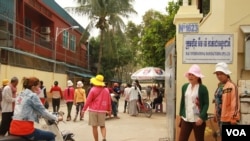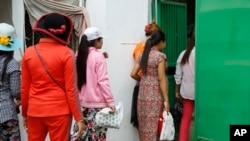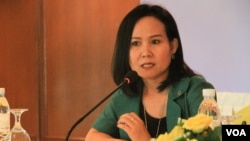Sdeung Phearong can still remember the mixed emotions she had when she decided to leave her family’s farm near the town of Kampong Cham after high school and move to Cambodia’s capital Phnom Penh to seek higher education.
Though she was full of hopes and dreams, she would have to go by herself and overcome many challenges, including the doubts of her family.
“My parents didn’t want me to come to the city because they were afraid of the obstacles I would face while living alone,” Sdeung Phearong said, recalling how she set out with little more than a backpack with some books, clothes and some savings.
Once she managed to find a $20-per-month apartment in Phnom Penh, she faced not only practical and financial challenges but also the conservative norms that bear down on women who live alone in Cambodia’s conservative, Buddhist society.
“My neighbors could hardly believe that I came to the city for studying, yet they assumed I would do something else that society loathes,” she said, referring to the fact that some poor Cambodian women end up working as hostesses in bars or enter the sex trade to survive.
While living in a poor area in the capital, the dreams of city life lost their glow. “Living alone and surrounded by drunk people, I did not feel secure to stay [alone]. Every night I felt scared,” the 24-year-old recalled in an interview with VOA Khmer.
Despite the challenges, Sdeung Phearong pushed on and - with strong encouragement from her brother - eventually completed a Bachelor in International Relations at the Royal University of Law and Economics, becoming the first person in her family to complete a university degree.
The challenges faced by Sdeung Phearong are representative of the experience of thousands of young women who migrate from the impoverished countryside every year to Phnom Penh. The capital is Cambodia’s main economic center and has a booming garment sector, growing tourism and services industries, and the best higher education opportunities.
HELPING MIGRATING WOMEN
A government report on rural-to-urban migration said such migration surged in the past decade and includes many young women, a third of whom end up working in garment factories. It noted the women often earn less than migrating men but remit more money back to their rural families.
The report, which was developed with the United Nations Population Fund, observed that women are less likely to migrate for educational purposes than men. It advises establishing “programs that encourage female educational migration” and educational scholarships for women, adding that better education, child care services and higher garment wages for migrating women would spread socio-economic benefits across the country.
The government’s 2014-2018 Strategic Plan for Gender Equality and Empowerment of Women observes that changing attitudes are also important, as “social norms on gender relations remain a major challenge in expanding education and training opportunities for girls and women.”
‘BOYS HAVE SO MUCH MORE OPPORTUNITIES’
After completing her studies, Sdeung Phearong had professional success - she works as an assistant at the British Embassy - and founded a volunteer-based NGO called Joint of Youth Cambodia that helps youths gain access to education.
“Education is an important thing that every woman should always remember in her heart and never give up,” she said, adding that with a higher education degree Cambodian women can overcome conservative norms limiting their potential.
Another rural girl who obtained a higher education and became a women’s activist is Thon Thavry, who authored a book about her experience called ‘A Proper Woman.’
“Boys have so much more opportunities than girls. Particularly, if parents are not able to afford accommodation for their sons; for example, boys can always request to become monks to live in a pagoda,” she said.
“When I went to school, people persuaded my mom to send me to work as a garment worker to earn money to help my parents. Such pressures have many disrupted women’s access to higher education,” she said.
Thon Thavry managed to leave the factory and completed a Bachelor degree in Information Technology, before going on to earn a scholarship to study in Europe.
A SAFE STUDY PLACE
Sonket Sereyleak, Education, and Gender Coordinator at COMFREL, a local election watchdog, said it was vitally important to help young women advance their education by offering them a safe place to live and study in the city.
“When people believe that the place they live is safe, fear and anxiety will go down, the level of learning will be strong and the focus on education is better,” she said.
Sonket Sereyleak added that attitudes among girls and their parents should also be addressed so they would feel confident about girls going off to study in the city.
Sdeung Phearong said she wants Cambodian young girls and women to gain support, while they should keep their motivation to pursue their dream strong.
“A sentence I always remember in my mind and tell myself is: ‘Keep trying and have a strong commitment,’” she said.










